by lauenc | Oct 7, 2024
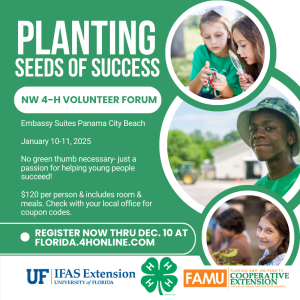 Dates: January 10-11, 2025
Dates: January 10-11, 2025
Location: Panama City Beach, FL
Are you excited about helping young people grow? Do you want to become a stronger leader and connect with others who share your passion? Then save the date for the Northwest 4-H Volunteer Forum in Panama City Beach! We’re looking forward to a weekend filled with learning, fun, and connection. This forum is a great chance for 4-H volunteers to gain new skills, share ideas, and make an even bigger impact on the youth we serve.
Volunteers are the heart of 4-H. You play a vital role in mentoring young people and helping them grow in projects like agriculture, science, health, and citizenship. Without your time and dedication, 4-H wouldn’t be able to fulfill its mission to empower and guide the next generation.
One of the best parts of attending the forum is the chance to network with fellow volunteers. Connecting with others who share your passion for 4-H opens the door to collaboration and learning from each other’s experiences. By building communities of practice, we strengthen our local programs and create lasting partnerships that help us serve youth more effectively. These connections can lead to new ideas, shared resources, and ongoing support from others who understand the challenges and rewards of volunteering.
At the forum, you’ll have the chance to attend workshops designed to strengthen leadership, build new programs, and provide helpful tips for mentoring youth. These sessions will be led by experienced 4-H Agents and volunteers who can’t wait to share their insights. You’ll leave with fresh ideas and skills to take back to your 4-H community, helping to make an even bigger difference.
Register today to be part of this exciting opportunity! Not only will you grow as a leader, but you’ll also contribute to the success of 4-H for years to come. Let’s work together to inspire the next generation of leaders and problem-solvers. Don’t miss out—come grow, connect, and lead with us!
Feel free to share this invitation with other volunteers or anyone interested in supporting 4-H. Let’s grow together!
Register in 4Honline now through December 10th.
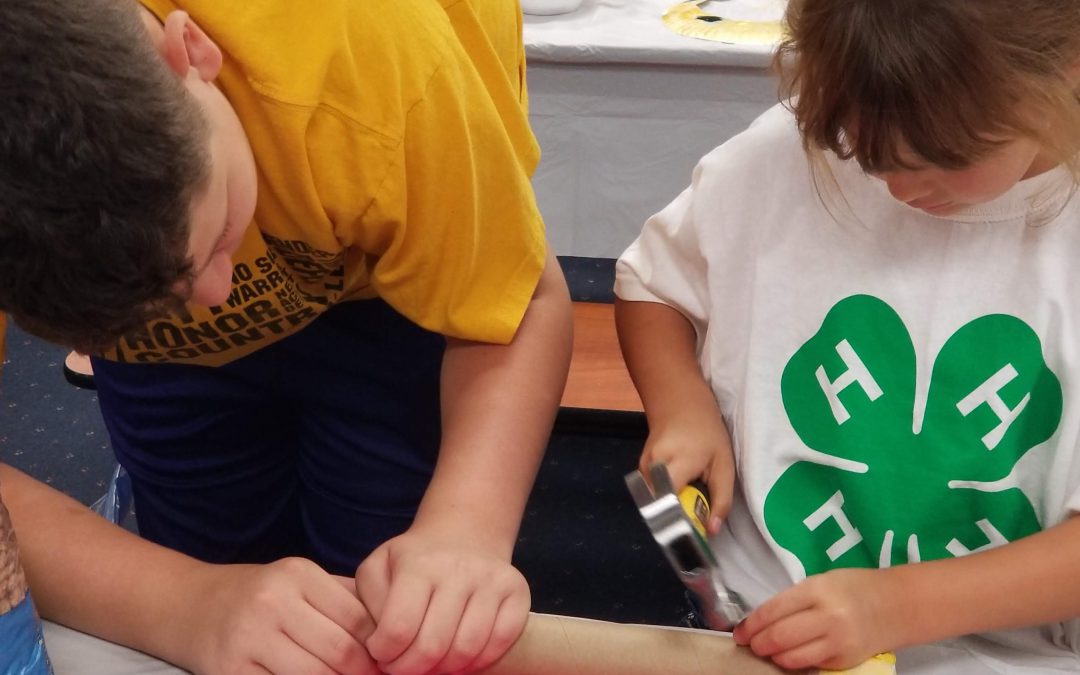
by Niki Crawson | May 19, 2023
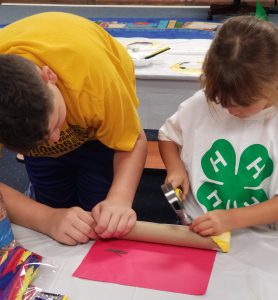
We know that younger youth look up to older youth and like to model their behaviors. We see it in siblings all the time, absorbing behaviors of their older brothers or sisters like sponges. Often times, younger youth find the attention and encouragement of older youth more relatable due to the closeness in age. Peer teaching fosters a more engaging and even symbiotic learning experience as this gives teens the opportunity to share and reinforce their own knowledge. In addition, by pairing the two age groups together in a learning environment, a sense of comradery can develop, creating a greater sense of belonging within the 4-H community. In this post, we will define peer teaching, share a few examples of how to utilize your teens as teachers and provide tips for getting peer teaching started in your clubs and other 4-H events and activities successfully.
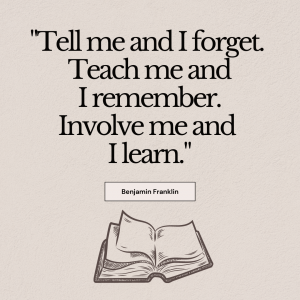
WHAT IS PEER TEACHING?
What do we mean by peer teaching exactly? It is the process of youth learning together and from each other through engaging, hands-on activities. In 4-H, we have the wonderful ability to utilize teens as volunteers and positive role models for our younger youth in our positive youth development programs. Empowering our teens as teachers for our younger members allows life skills to develop among our youth being instructed and also the instructors. The teen instructors are teaching specific topics to their peers at the same time they are strengthening their own leadership, communication, and social skills.
WHAT ARE THE BENEFITS OF PEER TEACHING?
As stated previously, one of the greatest outcomes is that the teacher and the student both gain knowledge and skills. It creates a mutually beneficial environment in which all youth can achieve personal growth and development if implemented and managed correctly. In addition, there are many other benefits of peer teaching such as:
- Peers being taught may form a quicker and better connection with teens due to communication, technology and other trends.
- An increase in peer confidence as they may feel more comfortable in asking questions, discussing topics with others closer to their age.
- Greater creativity as teens may have more innovative or modern ideas to bring to the activities.
- An increase in volunteers as teens have the ability to recruit more teens easier than typical adult volunteers.
- An increase in retention of youth as peers stay in the program and become the next generation of teen volunteers/teachers.
WHAT DOES PEER TEACHING LOOK LIKE IN 4-H?
Below are just a few programs for teens to practice the method of peer teaching in their 4-H county:
- New Members – When new youth join 4-H, it can be overwhelming at times to learn some of the 4-H activities, customs, and such. This would be a great opportunity for
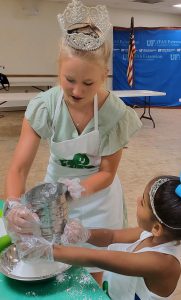 peer teaching. Have teens assigned to new members that join in order to teach them the 4-H pledge, motto, club expectations, member names, etc. This creates a greater sense of belonging and fosters a supportive environment within the club for new members to engage more quickly and successfully.
peer teaching. Have teens assigned to new members that join in order to teach them the 4-H pledge, motto, club expectations, member names, etc. This creates a greater sense of belonging and fosters a supportive environment within the club for new members to engage more quickly and successfully.
- Cloverbud Club Meetings – Utilizing your teen members in club meetings involving Cloverbuds (members ages 5-7) is a great way to incorporate peer teaching in your 4-H program. Younger members thrive off of creativity and enthusiasm which teens often portray easily. Teens can funnel this energy into teaching lessons to Cloverbuds that are engaging and interactive in a simplistic way.
- Summer Day Camps – 4-H programs often times need additional volunteers during the summer to assist with the volume of programming and youth participants. Therefore, summer is a great time to recruit teens to become peer teachers. Having teens as peer teachers helps with supervision and instruction while at the same time, allows them to stay involved in 4-H, continue to apply their life skills learned, and help the program teach life skills to other youth in the community.
TIPS TO GET PEER TEACHING STARTED IN YOUR 4-H COUNTY
What does it take to get peer teaching started in your 4-H county? Time and patience to start with. Teaching with teens is an ongoing task and will take a little effort on your part. Below are a few tips to get you started on having teens peer teach in your county:
- Identify programming that would benefit by peer teaching.
- Recruit quality teen teachers.
- Train and support teens as peer teachers.
- Assign teens appropriate roles in the peer teacher process.
- Model appropriate teaching methods in 4-H programs.
- Shadow teens in the role as peer teachers to provide support and guidance.
- Evaluate, provide feedback, and continue professional development for continued success.
Remember, peer teaching is a great way to utilize teen members in your 4-H programs. Younger youth need as many positive role models as possible in their lives. By having teen teachers take the lead in instruction in your 4-H programs, you are fostering an environment of learning, inclusivity, empowerment, and leadership.
To learn more about 4-H opportunities where teens can take the lead as teachers for their peers, please contact your local UF IFAS County Extension Office, or visit http://florida4h.org.
ADDITIONAL SOURCES:
Burse, G., Crocker, E. T., Jordan, J., McKinney, M., & Murphy, L. (2021). Teens as Teachers 4-H Project: Curriculum and Resources. UF/IFAS Extension, University of Florida. Retrieved May 1, 2023, from https://edis.ifas.ufl.edu/publication/4H432
Eckhoff, A., & Swistock, B. (2011). Staffing with Teenagers and Teens as Cross-Age Teachers. Rutgers Cooperative Extension.
by Julie McMillian | Mar 12, 2021
 As we look at the ever-changing social media journey, we think how can we keep up? Honestly, we probably never do and that’s okay. Social media can be an efficient way to communicate with 4-H families and also recognize the great things 4-Hers are doing! While you should never rely on only one form of communication to connect with every age group, social media can be an effective strategy. While Facebook is not the “go-to” platform for youth, most parents and community stakeholders are on Facebook. This article covers the basics of setting up a Facebook Group for your 4-H club the right way. Facebook is an approved platform through the University of Florida to use for 4-H, but there are some guidelines that need to be followed:
As we look at the ever-changing social media journey, we think how can we keep up? Honestly, we probably never do and that’s okay. Social media can be an efficient way to communicate with 4-H families and also recognize the great things 4-Hers are doing! While you should never rely on only one form of communication to connect with every age group, social media can be an effective strategy. While Facebook is not the “go-to” platform for youth, most parents and community stakeholders are on Facebook. This article covers the basics of setting up a Facebook Group for your 4-H club the right way. Facebook is an approved platform through the University of Florida to use for 4-H, but there are some guidelines that need to be followed:
1. Ask your local 4-H agent to be an administrator with you. Two sets of eyes are better than one and they can help you follow the right path for youth protection and be a resource for correct branding and logos. Also, if your 4-H agent is an administrator, it is really easy for him or her to share posts to the county 4-H page (when appropriate).
2. Create a Facebook Group instead of a Facebook Page for your club. Unlike Facebook Pages, you can change Group privacy settings and limit who can see information. Anyone can follow a Facebook Page whereas a Group can allow only approved members to see information. We must be sensitive to the personal information we share about our youth. How do I create a Facebook group? Steps for creating a FB Group
3. Follow the emblem guidelines for the proper use of University of Florida’s 4-H name and brands. UF IFAS Extension 4-H Graphics. Don’t forget that your club needs to be chartered in order to use the 4-H Name and Emblem.
4. Know who has a publicity release in your club. Youth with no photo release should not be shared in private groups and club leaders who will share information in the group must be aware of these limitations. Participation Release
5. If social media isn’t your “thing,” enlist help from another volunteer! You could also delegate responsibilities to one of the youth officers in your club to help with posting and interactions (with supervision of course).
Now you might be thinking what should a 4-H club talk about on Facebook? How will this Group be helpful? Here are a few ideas:
- Upcoming events
- Sharing of information and questions
- Advertisement for your club
- Fundraisers
- Recognize youth (if you have parental consent)
- Pictures, videos, and articles
- Challenges and surveys
- Information from the District and State programs
4-H volunteers are the true leaders who help our youth succeed by providing meaningful experiences every time programming is delivered. Our hope is that you feel empowered to incorporate positive engagement with youth by using relevant and innovative communication as technology advances. To learn more about incorporating social media for 4-H clubs or becoming a 4-H volunteer, join us next Thursday, March 18th at 6pm central/7pm eastern for our webinar on social media for 4-H clubs. You can also contact your local UF IFAS Extension Office UF IFAS Extension Office or visit Florida4-H.org.Social Media Tips
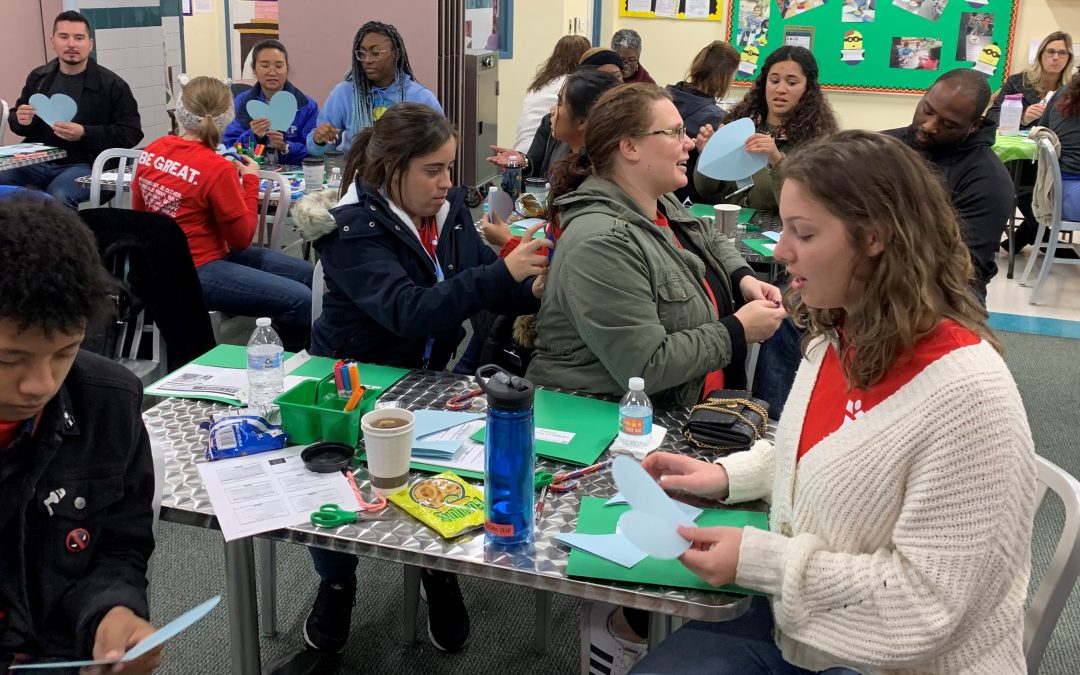
by pmdavis | Mar 6, 2020

4-H Volunteer Training about healthy relationships!
Make 2020 the year you learn something new or share your talents with a young person in your community. 4-H, the nation’s largest youth development and empowerment organization, cultivates confident youth who tackle the issues that matter most in their communities. It allows youth to learn by doing. 4-H relies on screened, dedicated volunteers to promote its mission to help youth gain the knowledge and life skills they need to be productive, responsible citizens.
In the Florida Panhandle, we have 4-H programs in schools, afterschool settings, and on military bases where we provide curricula and training to enhance our youth experiences while being active in 4-H. We also have school enrichment programs offering youth 4-H experiences on a specific subject while in school. We have community clubs and special interest groups that are currently active and we need more caring compassionate adults to help! These opportunities are great for families to do together.
If you only have time for a short-term event and like sewing, grilling, cake decorating, gardening or love bugs and outdoor education, consider volunteering. Contact your local Extension Office to see what spring and summer workshops and day camps are being offered that need caring adults to act in the role of 4-H volunteers. Your time as a volunteer will provide our youth the safe place to pursue whatever interests, causes, and leadership roles are most important to them. It also allows you to learn from the youth about current trends, fashions and technology. It really is a two-way learning opportunity where all involved learn by doing.

To volunteer, even for the summer workshops, you will need to be screened and trained, so contact us now. The screening and training process takes a little time. Please considervolunteering in your community. With over 70 different 4-H project areas from money and finances, gardening to computer science and rocketry, there are plenty of areas to work with youth to share your knowledge and skills. Please consider helping us live up to our motto of “making the best better” with 4-H by volunteering today. Simply contact your local extension office or check out our website for more information.
by Whitney Cherry | Apr 18, 2019
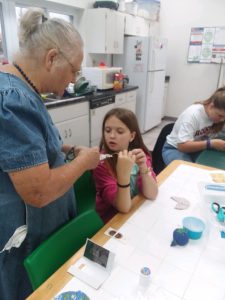
Volunteers across the panhandle make a difference in the lives of young people in their communities by simply sharing the things they love.
June Clemons and Peg Frith are a mother-daughter team who can do anything! From time to time, they’ve volunteered for 4-H, but the first time I asked them to help me teach a small sewing project during a cooking day camp, I knew I’d struck gold. Anyone can learn to sew but having the patience to teach it…that’s a whole other story.
It took me a couple of years to talk them into leading a sewing club, and honestly, I think they talked themselves into it. The holdup wasn’t a lack of desire to help; it was hesitancy to commit to something but not being able to follow through.
In fact, Peg’s advice to anyone thinking about becoming a 4-H volunteer is:
“I’d tell them it can be hard to find the time to plan, organize, and implement meetings, but it’s very rewarding. If you commit, see it through. Don’t disappoint the children.”
June emphatically said, “Do it!”
So why do June and Peg commit their precious time to 4-H? They first got involved because they had positive experiences as 4-H’ers and wanted to pass on the skills they learned. But now, it’s the kids they work with that keep them coming back. They both said that “teaching useful, lifelong skills to children and just enjoying being with them as they learn,” is their favorite part about volunteering with 4-H.
I asked June and Peg if they thought their 4-H work was making a difference.
June says, “All you have to do is see the joy in their faces upon completing a task to know how it affects the members.”
Peg added, “I get to see firsthand their sense of accomplishment. And the fact that they keep coming back to class tells me that the club is making a difference in their lives.”
As further evidence that June and Peg are making a difference, club parents have shared their children not only come home from their sewing club meetings excited to show what they made that day, but they have also started stitching up seams in their clothes and stuffed animals.
As a 4-H agent, I can tell you that the independence and mastery displayed by these young club members is exactly what we’re looking for from our 4-H’ers, and good club leaders help them achieve it.
Are you wondering if you have what it takes to make a difference in the lives of young people in your community?
You don’t have to be an expert. You don’t have to have kids or grandkids of your own. You don’t have to have been a former 4-H’er. You just have to love something enough to want to share it with the next generation. So what’s your passion? Pass it on!
There are many ways to volunteer with 4-H, and we need you – from fair exhibit and public speaking judges, to club leaders, chaperones, camp nurses, and more. To pass on your passion and help the youth in your area Grow in 4-H, contact your local UF/IFAS Extension Office to find the best volunteer role for you.
 Dates: January 10-11, 2025
Dates: January 10-11, 2025








